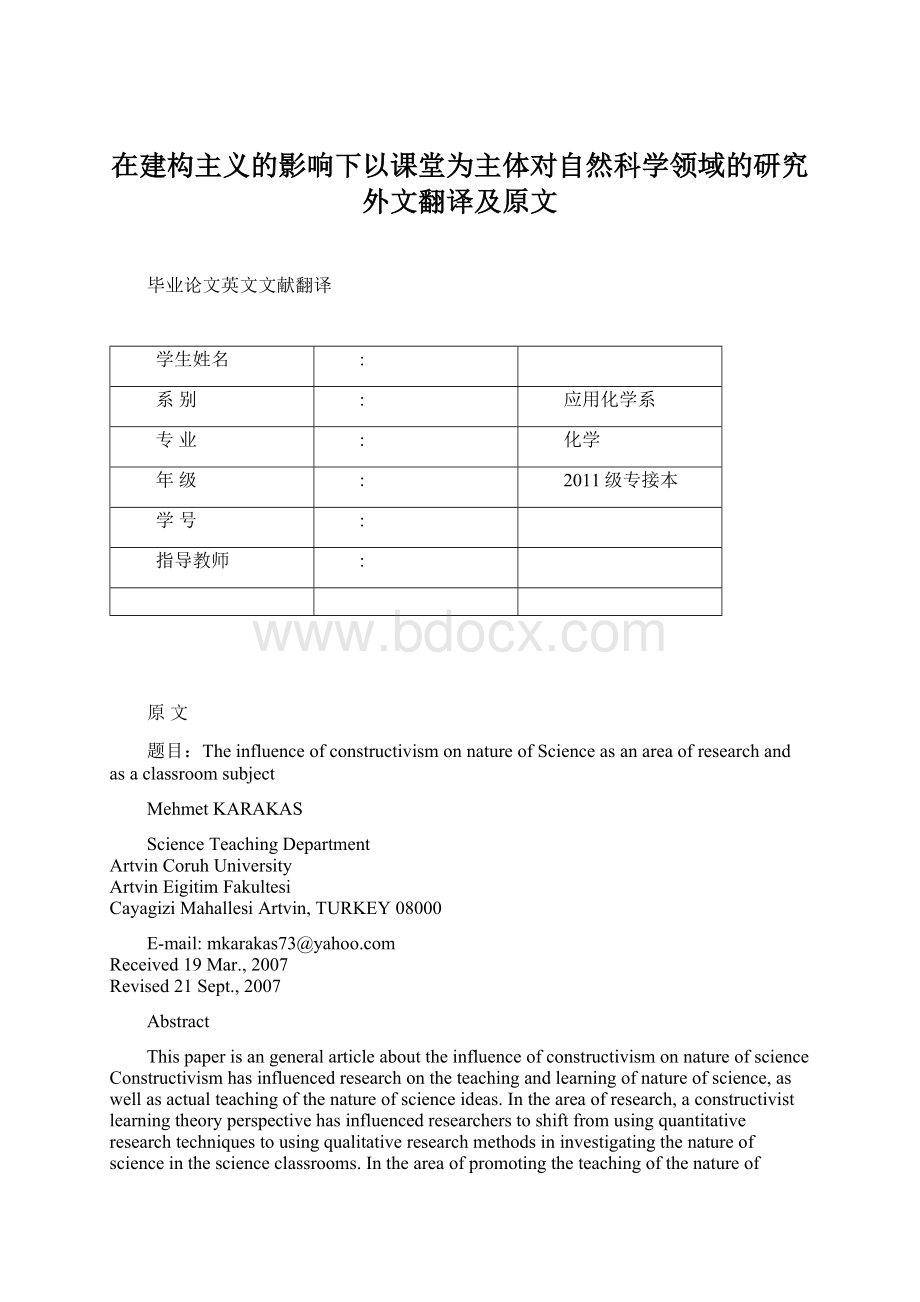在建构主义的影响下以课堂为主体对自然科学领域的研究外文翻译及原文.docx
《在建构主义的影响下以课堂为主体对自然科学领域的研究外文翻译及原文.docx》由会员分享,可在线阅读,更多相关《在建构主义的影响下以课堂为主体对自然科学领域的研究外文翻译及原文.docx(14页珍藏版)》请在冰豆网上搜索。

在建构主义的影响下以课堂为主体对自然科学领域的研究外文翻译及原文
毕业论文英文文献翻译
学生姓名
:
系别
:
应用化学系
专业
:
化学
年级
:
2011级专接本
学号
:
指导教师
:
原文
题目:
TheinfluenceofconstructivismonnatureofScienceasanareaofresearchandasaclassroomsubject
MehmetKARAKAS
ScienceTeachingDepartment
ArtvinCoruhUniversity
ArtvinEigitimFakultesi
CayagiziMahallesiArtvin,TURKEY08000
E-mail:
mkarakas73@
Received19Mar.,2007
Revised21Sept.,2007
Abstract
ThispaperisangeneralarticleabouttheinfluenceofconstructivismonnatureofscienceConstructivismhasinfluencedresearchontheteachingandlearningofnatureofscience,aswellasactualteachingofthenatureofscienceideas.Intheareaofresearch,aconstructivistlearningtheoryperspectivehasinfluencedresearcherstoshiftfromusingquantitativeresearchtechniquestousingqualitativeresearchmethodsininvestigatingthenatureofscienceinthescienceclassrooms.Intheareaofpromotingtheteachingofthenatureofscience,aconstructivistlearningtheoryperspectivehasinfluencedscienceeducatorstoshiftfrommerelyemphasizingtheteachingofthehistoryofscienceinscienceclassroomstosequencingininstructioninsciencelessonsandpromotionofbetterteacherpreparationprogramsintheuniversities.
Introduction
Sciencecurriculavarywidelyamongcountries,states,schooldistricts,andindividualschools.Themostvividdifferencesareconcernedwiththeparticularsciencetopicsorconceptstobeincluded.Suchdifferencesincourseandcurricularcontentareunavoidable,aseachcoursemustpresentonlyasmallsampleofthescientificgeneralizationsandprinciplesdrawnfromaconsistentlyandrapidlyexpandingdiscipline(Lederman,1992).Thereisnoconsensusamongscienceeducatorsconcerningthespecificcontenttobeincludedincontemporarysciencecoursesoreventhemethodsandstrategiesofinstructiontobeused.However,thereappearstobestrongagreementonatleastoneoftheobjectivesofscienceinstruction.Thedevelopmentofan“adequateunderstandingofthenatureofscience”oranunderstandingof“scienceasawayofknowing”continuestobeconvincinglyadvocatedasadesiredoutcomeofscienceinstruction(AmericanAssociationfortheAdvancementofScience(AAAS),1989,Lederman,1992).Althoughthe“natureofscience”hasbeendefinedinnumerousways,itmostcommonlyreferstothevaluesandassumptionsinherenttothedevelopmentofscientificknowledge(Lederman&Zeidler,1987).Thischaracterizationneverthelessremainfairlygeneral,andphilosophersofscience,historiansofscience,sociologistsofscience,andscienceeducatorsarequicktodisagreeonaspecificdefinitionforthenatureofscience(NOS).Suchdisagreement,however,shouldnotbesurprisinggiventhemultifacetedandcomplexnatureofthehumanendeavorwecallscience.Moreover,similartoscientificknowledge,conceptionsofNOSaretentativeanddynamic:
Theseconceptionshavechangedthroughoutthedevelopmentofscienceandsystematicthinkingaboutitsnatureandworkingsdidtoo(Abd-El-Khalick&Lederman,1998).However,attheend,thereisanagreement(eventhroughnotcomplete)aboutnatureofscienceamongscienceeducatorsthatscientificknowledgeistentative(subjecttochange),empiricallybased(basedonand/orderivedfromobservationsofthenaturalworld),subjective(theory-laden),partlytheproductofhumaninference,imagination,andcreativity(involvestheinventionofexplanation),andsociallyandculturallyembedded.Alsotwoadditionalimportantaspectsarethedistinctionbetweenobservationsandinferences,andthefunctionsofandrelationshipsbetweenscientifictheoriesandlaws(Lederman,Abd-El-Khalick,Akerson,2000).
TheaimofthispaperistolookathowoneparticularlearningperspectivehasinfluencedtheresearchonNOSandthewaythenatureofscienceistaughtbyreviewingsomerelevantNOSstudies.Manyresearcherstakingdifferentresearchperspectiveshavedoneresearchinthenatureofscience.Thispaperexamineshowaconstructivistlearningtheoryperspectivehasinfluencedresearchonthenatureofscience,aswellastheteachingandlearningofthenatureofscience.Indoingso,thispaperdividesintothreeparts.ThefirstpartlooksatthehistoricaldevelopmentofthenatureofscienceanddiscussesthecurrentstatusofresearchontheteachingandlearningofNOS,aswellastheteachingandlearningofNOSinpre-collegeclassrooms.SecondpartdiscusseshowconstructivismhasinfluencedresearchontheteachingandlearningofnatureofsciencebyexamininghowresearchintheareaofNOSwasconductedpriortotheuseofconstructivismasalearningtheoryperspective.Inthethirdpart,thepaperexaminestheinfluenceofconstructivismonteachingandlearningofnatureofscienceideasinclassroomsbyfirstexamininghowNOSwaspromotedpriortotheuseofconstructivism,andthencomparethiswithhowtheywerepromotedusingaconstructivistperspective.
ThenatureofScienceasacontentarea
ThelongevityofthenatureofscienceobjectiveinscienceeducationisattestedtobytheNationalSocietyfortheStudyofEducation(1960)andHurd(1960)whoclaimtheexistenceoftheobjectiveofteachingthenatureofscienceintheAmericanschoolsasearlyas1920.Actually,onecantracetheadvocacyforstudents'understandingsofnatureofsciencetothereportsoftheCentralAssociationofScienceandMathematicsTeachers(1907)inwhichastrongargumentwaspresentedforincreasedemphasisonthescientificmethodandtheprocessesofscience.Concernsforthedevelopmentofadequateunderstandingsonthenatureofscience“havewornmanyhats”throughtheyears(Lederman,1992).Intheearly1900sthenatureofscienceobjectivewasexpressedintermsofincreasedemphasisonthescientificmethod“soastobettertrainstudents'mentalfaculties”(Hurd,1960);inthe1960stheobjectivewaslinkedtotheadvocatedemphasisonscientificprocessandinquiry(Welch,1979);andmostrecentlyithasbeenincludedasacriticalcomponentofscientificliteracy(AmericanAssociationfortheAdvancementofScience,1989;NationalScienceTeachersAssociation,1982).Clearly,scienceeducatorsandscientistshavebeenextremelypersistentintheiradvocacyforimprovedstudentunderstandingofthenatureofscience.Indeed,Kimball(1968)hasreferredtothisobjectiveasoneofthemostcommonlystatedobjectivesforscienceeducationandSaunders(1955)wentsofarastodescribeitasthemostimportantpurposeofscienceteaching.
Researchrelatedtothenatureofsciencecanbeconvenientlydividedintofourrelated,butdistinct,linesofresearch:
(a)assessmentofstudentconceptionsofthenatureofscience;(b)development,use,andassessmentofcurriculadesignedto“improve”studentconceptionsofthenatureofscience;(c)assessmentof,andattemptstoimprove,teachers'conceptionsofthenatureofscience;and(d)identificationoftherelationshipamongteachers'conceptions,classroompractice,andstudents'conceptions(Lederman,1992).
Althoughthebeliefintheimportanceofstudents'understandingsofthenatureofsciencehaspersistedthroughthetwentiethcenturyasmentionedabove,assessmentsofstudents'conceptionsdidnotstartuntil1954(Wilson,1954).Initialassessmentsofstudents'conceptionsindicatedthatstudentsdidnotpossessadequateunderstandingsofNOSandledtotheconclusionthatscienceteachersmustnotbeattemptingtoteachnatureofscience.AsecondlineofresearchfocusingaroundcurriculumdevelopmentandassessmentwasinitiatedbyCooleyandKlopfer(1963).Theresultsofthismovementwereambiguous.Thatis,thesamecurriculumwaseffectiveforoneteacherwithaparticulargroupofstudents,butnotforanotherteacherwithdifferentgroupofstudents.Theappropriateconclusionwasthattheindividualscienceteachermustmakeadifference.Predictably,asubsequentlineofresearchfocusedontheassessmentofteachers'conceptions.Disturbingly,therewasnoattempttofocusonthebehaviorsandotherclassroomvariablesrelatedtoindividualteachers.Theassessmentofteachers'conceptionsofthenatureofscienceindicatedthattheydidnotpossessthedesiredlevelofunderstanding(Lederman,1992).Becauseteacherscannotbeexpectedtopurposefullyteachwhattheydonotunderstand,manyresearchersfocusedtheirattentiononthedevelopmentandassessmentoftechniquesdesignedtoimproveteachers'understandingsofNOS(Lederman,1992).Unfortunately,theresultsofsuchattemptswereambiguousandthespecificvariablescontributingtoimprovedconceptionsofNOSremainedunknown.
Theabovementionedlinesofresearchwereinformedbytwobasicimplicitassumptions:
ateacher'sunderstandingofthenatureofscienceisrelatedtohis/herstudents'conceptionsandateacher'sinstructionalbehaviorsanddecisionsaresignificantlyinfluencedbyhis/herconceptionsofnatureofscience(Lederman,1992).Recognitionoftheseassumptionsandtheresultsofgeneralresearchonteachingcontributedtoarefocusingofresearchers'attentionsonthetestingoftheseassumptionsandattemptstoderivethoseclassroomvariablesrelatedtochangesinstudents'conceptions(Brickhouse,1990).Interestingly,Trent(1965)hadmadesuchrecommendations30yearsearlier.Asaconsequenceofthismorerecentresearch,itappearsthatthemostimportantvariablesthatinfluencestudents'beliefsaboutthenatureofsciencearethosespecificinstructionalbehaviors,activities,anddecisionsimplementedwithinthecontextofalesson.Itappearsthatcontinuedstressonhigher-levelthinkingskills,problemsolving,inquiry-orientedinstr